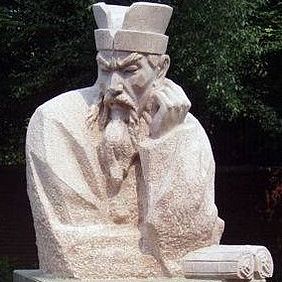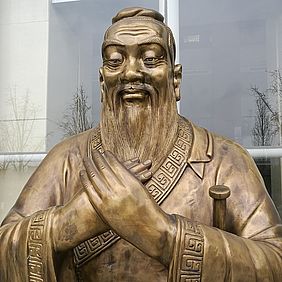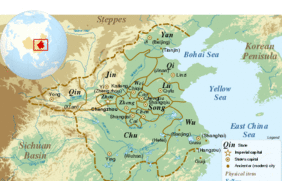Especially in the West there has been an ample justification for characterizing imperial China as a Confucian state or society (Li 2000). This idea is generally witnessed by the fact that Confucianism, indeed, has contributed much to shape the political society from the Early Han Dynasty to the Late Qing Dynasty, a period of more than two thousand years. Especially in the West, this Confucianism-centered notion about China has been supported by the fact that early Western scholars like for instance the Italian Jesuit Matteo Ricci or the German sociologist Max Weber used to focus almost entirely on Confucianism when they reported about China. However, in the 20th century a growing number of Western scholars opened up more books about different schools of Chinese thought like for instance The Book of Lord Shang. The purpose of these academic notes, thus, is herewith to call attention to the Legalist contribution to the Chinese political development and, so to say, to counterbalance the seemingly exclusive importance that is often attached to the better known Confucianism with the lesser known Chinese Legalism.
The latter two schools, Daoism and Moism, will not be covered here. Firstly, I consider Daoism in the political sphere less influencial than Legalism and Confucianism, while it has been and is still much more influencial in the religious sphere. Secondly, Moism had already lost its political, cultural, and societal influence much earlier, even before the unification of the first Chinese empire. Thus, both Daoism and Moism deserve special attention in different chapters of my teachings. At this point of the introductory lecture I just quite briefly feel the need to mention the Huang Lao (or Yellow Emperor) School of Thought which combined Daoist with Legalist political philosophy during the early era of the rising Qin Kingdom and the later Qin Empire. The Huang Lao School of Thought had even remained very influencial during the early Western Han Dynasty before its significance faded out when Daoist ideas slowly were being replaced by Confucianist aspects of political administration, while Legalism prevailed.
Legalism in China is regularily linked to the minister and chancellor Shang Yang living and working in the 4th century BC, while Confucianism is, of course, linked to Confucius who lived and taught in the 6th and 5th century BC. Confucius (c. 551-479 BC) died about 90 years before Lord Shang (c. 390-338 BC) was born.
The Way (道) of Heaven (天)
In ancient Chinese thought, "the Dao" (sometimes also translated to "the Way") of Heaven is at the center of attention. This notion or belief should rather not be misinterpreted for being purely a philosophical idea. It is religious as well. At that time, Religion and philosophy was not clearly seperated yet, neither in China nor in Europe.
The Dao itself refers to a thing's characteristic mode of existence. It reminds me a bit of Leibniz' monads and his principles of a pre-established harmony. In ancient Chinese belief, though, Heaven has an impersonal ordering force where Heaven has its somewhat superior Dao while each of the Ten Thousand Things (万物) has its own Dao and meaning as for each resembling an individualization of the greater Dao of Heaven. Thus, whether each single thing receives its Dao depends on whether it exists and/or acts in accordance with the superior Dao of Heaven which is considered divine, eternal, and without flaws, just perfect. Diffences and similarities of Leibnitz' monadology with the Dao shall be discussed in a different chapter. At the time of Confucius and beyond, however, in the late Spring and Autumn and in the Warring States period the Dao of Heaven had been found to not prevail. Confucius himself was said to be on a "divine mission" because Heaven has ordered him to wake the people up in order to restore the Dao. In Confucianism this "greatest teacher of all", Confucius, is thought to know Heavens will by oberservation and deeper understanding.
The main political questions related to the Dao in Confucianism and Legalism are related to the proper way of restoring order in society. While Confucius asks how to restore the Dao and in this way how to achive the proper way of political conduct ethically, in Legalism Lord Shang raises the question on how to achieve political power and how to effectively maintain it. In Confucianism, the emperor is by fact supposed to serve the people like the greater Dao of Heaven is serving the individual Dao of the Ten Thousand Things. And Lord Shang might be inclined to argue that this counts for his Legalist way, too. However, in Legalism the interests of the emperor and the interests of the people are systematicly opposed to each other. Even though the Legalist emperor has the ambition to enrich and to arm the people for the sake of the people, in fact and conclusively, as we will learn, in Legalism the people finally serve the emperor.
Below, firstly, main political ideas that are generally ascribed to Confucius will be introduced. Then, secondly, basic principles of Legalist political reforms that have been implemented by Shang Yang, Hanfeizi, Lü Buwei, and Li Si are summarized below, before comparing their main diffences and explaining how a combiniation of them both shaped the political development of China ever since and until today.
Confucianism (儒)
In the Analects (论语) Confucius asks where the Dao is in being human. His key notion here is Ren (仁). For a better understanding of the meaning of Ren it might help to analyze the character itself. It is composed of the radical "man" (人) and of the component "two" (二). Ren does not stand alone. Ren is a social relationship. Thus, being human, for Confucius, it means to have good human relationships. Individualism doesn't make much sense for Confucius because every particular virtue only exists and only makes sense in human relationships that consist of at least two or more people. Benevolence, love, wisdom, courage, or for instance humanity only make sense in human relations. From this point of view, individualism does not create any of them. Though individualism as a general concept does, indeed, exist in ancient China, Confucianism does not consider it as a relevant starting point of reflection for a harmonious society.
As a general quality Ren resembles humaneness, human excellence, and humanity - all qualities that make men noble. The Chinese gentleman, or noble man (君子), used to be considered "noble" when being born into the lineage of an ancient aristocratic family. But Confucius disagreed. He reformed the term "noble man" by turning its meaning to "exemplary man". Obviously scorning the ceaseless ethical misbehaviour of countless aristocrats of his time he sought for an alternative to restore the Dao. His solution was Ren. From his point of view, only those men who act according to the general qualities of Ren, being benevolent, caring, and loving for the people, having achieved wisdom and proven courage, only those deserve to be considered "noble". For Confucius the human qualities of Ren are even more important than one's individual life. It might happen that a noble man has to accept death in order to accomplish Ren (Analects 15:9). According to Confucius' follower Mencius (c. 380-289 BC) to be Ren means to be a man.
Human excellence, of course, needs an explanation. Confucius' approach to explain human excellence is an appeal to restore the traditional values of the anteceding Western Zhou Dynasty (c. 1122-771 BC). His notion is a "Golden Age" where, in this case, the Zhou Dynasty (周朝) had once claimed the Dao while it has already been lost at Confucius' time. Therefore, he eagerly collected, studied, and restored classical canonical texts and used them for the literary curriculum of his own school. Restoring the Dao for him meant a sceptical reflection of the classics and, in this way, the preservation of culture.
In this context, returning to the traditional values and, thus, achieving human excellence is accomplished by returning to the traditional rites (礼) of the forefathers. Their ideal is a humane social hierarchy modelled on family relationships, constituting five cardinal relationships of a harmonious society (五伦) with loyalty (忠), filial piety (孝), fraternal obligation (悌), patience or tolerance (忍), and benevolence (善) at its core. Let the ruler be the ruler, the father be the father, let the son be the son (Analects 12:11). Those above listed five qualities of humaneness constitute herewith the Confucian fundament of the relationships between king and subject, husband and wife, father and son, the elder and the younger, the bother and the brother. In this sense, even friends and neighbors should consider each other brothers. The, for that period, revolutionary thing about Confucius' teachings was that everybody is eligble to achieve nobility by having the right feeling of love for humanity and the proper knowledge of righteousness (義).
Legalism (法)
The Chinese Legalist tradition struggles with the Confucian notion of a "Golden Age". To the fear of implementing Legalist reforms because of possible popular discontent Shang Yang provides the following reply: When the sage finds ways to strenghten his realm (国) he does not necessarily have to abide by the old traditions. When he knows measures to benefit the people, he should not cling to rites (礼). Shang Yang opposed the ancients because he believed that both rites (礼) and laws (法) were just products of particular eras and their certain social and natural circumstances. Therefore, opposing the anteceding traditions would not be necessarily wrong. Instead Shang Yang and the Legalists in general developed a progessive view upon history where it is not absolutely essential to follow the ancient way (道).
By regarding history as a series of stages with a continuous progression in the course of the timeline, Chinese Legalists like Shang Yang divided the origins of the realm into three historical stages: the matriarchal stage, the Confucian stage, and the Legalist stage. According to this idea, during the period of high antiquity and the matriarchial stage people lived in small clan-like villages, loved their relatives and were fond of what was their own. While during middle antiquity when people lived in larger town-like villages, they honored talent and were pleased with moral virtue. This period Legalists referred to as being the relatively lesser developed Confucian stage of social progression. However, in the later days of Shang Yang's era when large towns, cities, and state-machineries were established people had to respect officials. In this weltanschauung (world-view) social conditions are given and cannot be changed, however, the ways of action are laid down by mankind.
According to ancient Legalists a man-made state-machinery must be established with "evil officials", who are being contrasted to "good officials", in order to prevent chaos and disorder among a growing number of people living in flurishing city-like societies. The Book of Lord Shang states accordingly (translation by J. J. L. Duyvendak):
用善,則民親其親;任姦,則民親其制。
If virtuous officials are employed, the people will love their own relatives, but if wicked officials are employed, the people will love the statutes.
Those "evil officials" of Legalism respect law (法). Therefore they should be understood opposite to the meaning of "good officials" in Confucianism whose nobles respect rites (礼). According to Legalists thought filial rites (孝礼), though, must be avoided totally because they cannot guarantee unconditional righteousness (義) in large societies. For Legalists only law is able to establish that kind of order, because only laws are completely blind to personal relationships while the traditional rituals of the ancestors, on the contrary and by nature, cannot be blind at all.
Conclusively, the sage has to divide the land and the property, he has to establish "evil officials" to avoid filial rites, and he must unify all the officials under one ruler and one book of law. In fact, this progressive theory of the historical origin and development of the realm provided a theoretical basis for the concept of the "rule of law" of a rising landowner class society in ancient China.
Shang Yang arrived in the Kingdom of Qin (秦) in 361 BC and soon became minister in 355 BC. After he received his promotion to chancellor in 352 BC he started to implement Legalist reforms from 350 to 340 BC. Two years later in 338 BC he was executed on the grounds of laws that he had created and implemented himself. In total, his political activities lasted only a very brief moment in the history of the Qin. However, in this very short time he had managed to transform the Qin realm from a backward kingdom to a powerful and advanced state-leviathan. He accomplished that in a threefold way:
- Implemention of a Book of Law
- Establishment of a New System of Honory Titles
- Economic Inducements to the Agricultural Sector
The Book of Law was previously compiled and promulgated in the neighbouring eastern kingdom of Wei by the Legalist Li K'uei. Shang Yang, born and raised in the State of Wei, added an infamous "Law of Collective Liability" to it before he introduced the book to the State of Qin. It then consisted of a unified houshold registration system and included the introduction of the first known identification card sytem on earth. The houshold registration system grouped the people into five and ten houses of mutual liability. At its core, Lord Shang's Book of Law was founded on fear of harsh penalties for anybody trespassing its laws. The household registration system with its principle of mutual liability was to make sure that trespassers would be found and punished accordingly. Each household had to report on "evil persons". If an individual had failed to report and concealed crimes he would be deemed to be guilty for the same offense and punished alike. Rather saying, a person who failed to report on and expose an "evil person" would be cut in two. Whereas one who reported on and exposed a trespasser would be rewarded in the same way as one who decapitated an enemy at war. While any individual who harboured an "evil person" would be punished in the same way as one who surrendered to the enemy. Kinship made no difference. On the contrary, family bonds and clan ties were obsolete in the household registration regime.
With the same fervor like the Confucians the Legalists were, too, very sceptical of the aristocratic legitimacy, but rarely anyone repressed the aristocrats as ruthlessly as the Legalists did. Lord Shang abolished their old hereditary privileges in the political sphere and established a completely new hierarchical system by which official appointments and honorary titles were granted in accordance, firstly, with any individual's military, secondly, with anyone's agricultural merits. The new honorary titles and a number of twenty new grades replaced the hierarchical system of the ancient aristocratic clans with that of the rising land-owner class society. Shang Yang defined with his reforms a completely new social setup and allotted each individual his (according to Lord Shang's Legalism) appropriate property on land, women, slaves, and ornaments stipulated by the rites. Thus, from Shang Yang's reforms on, all land, women, slaves, and clothing had to conform to the newly established twenty grades. In the realm of the Qin and within this very short period of Lord Shang's reign that didn't even last for twenty years, the old traditional and aristocratic political privileges had completely lost their meaning.
Economically, Shang Yang considered the agricultural sector as the fundamental industry, regarding it the basic productive enterprise of the Qin economy. Therefore, he gave inducements to peasants while he put heavy restrictions and burdens upon merchants. The people were supposed to work hard at the fundamental occupations of farming and weaving, where those who harvested or produced the most would be exempt from levies regardless their former filial status. Whereas trade and handicraft industries were deemed to be subsidiary and disdained profit-seeking enterprises. Those who engaged in such subsidiary occupations or were regarded as idle and poor had had their wives and sons enslaved.
Historical Development and Conclusion
What do we now make of this information? The Legalist exemptions from levies on households were so far, before Shang Yang's reforms, only used in the Kingdom of Wei. And there it was originally meant only for rewards in the military service. Lord Shang was the first to introduce this system of rewards to the argricultural sector, and this practice remained in general use from the Qin and Han down to the Tang and Song Dynasties. Economically spoken, it effectively supported the rise of a new political landowner class that enabled the Qin clan over a hundred years later to conquer the entire Chinese Plain and beyond. However, when Shang Yang implemented his Legalist reforms he had not only laid the foundations of the Qin Empire in 221 BC, but he caused its downfall 15 years later in 206 BC as well. The establishment of such a system of cruel punishments that was flanking his system of rewards for the economy, as well as the inhuame suppression of trade and artisanry at the same time terrorized the people, choking to death any form of creativity because no-one even knew anymore where to place hands or feet.
As a consequence, even though Legalism prevailed in China, the early Han Dynasty already slowly introduced Confucianist measures to easen any burden on the people. Law and rites were balanced ever since the time of 140 BC.


